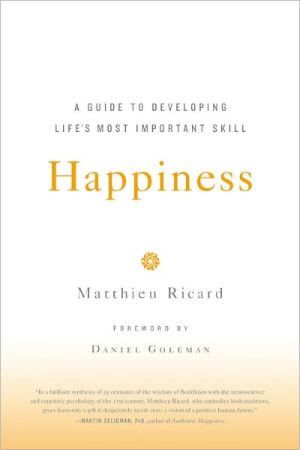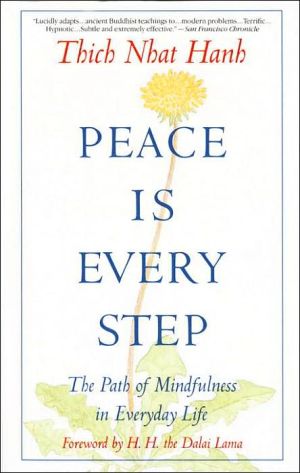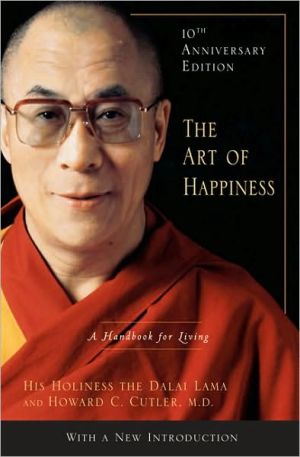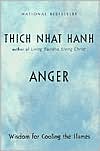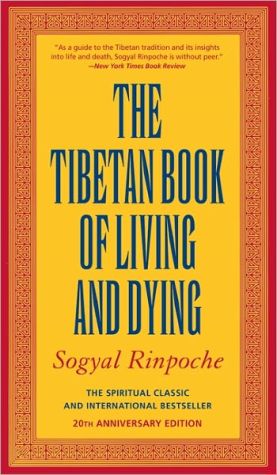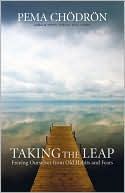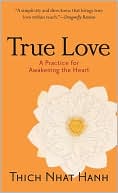Happiness: A Guide to Developing Life's Most Important Skill
A molecular biologist turned Buddhist monk, described by scientists as "the happiest man alive," demonstrates how to develop the inner conditions for true happiness.
Search in google:
A molecular biologist turned Buddhist monk, described by scientists as "the happiest man alive," demonstrates how to develop the inner conditions for true happiness. Publishers Weekly For millennia, philosophers, writers and artists have sought the key to human happiness. A Buddhist monk and former cell biologist, Ricard offers his own musings about the nature of happiness and tips on how to attain it in his sometimes tedious, sometimes dynamic guide. Happiness, for Ricard, cannot be found in fleeting experiences of pleasure-the joy of a sunny day, the refreshing taste of an ice cream cone, the ecstasy of sex-but only in the depths of an individual's being. Happiness is not self-interested, but rather compassionate, seeking the well-being of others. If we are truly happy, writes Ricard, we can change the world because of our compassion for others and our desire to end hatred and bring happiness even to those we don't like. For Ricard, happiness is a deep state of well-being and wisdom that flourishes in every moment of life, despite the inevitability of suffering. Individuals can, however, learn to minimize suffering in life by practicing moderation in all things, as well as meditation. Meditative exercises that individuals can practice to achieve happiness appear in each chapter. Ricard (Tibet: A Compassionate Eye) doesn't have much new to tell us about his subject, but he imbues these reflections with his own deep sense of happiness and verve. (Apr. 12) Copyright 2006 Reed Business Information.
Happiness\ A Guide to Developing Life's Most Important Skill \ \ By Matthieu Ricard \ Little, Brown\ Copyright © 2003 NiL editions, Paris\ All right reserved.\ ISBN: 0-316-05783-5 \ \ \ Chapter One\ TALKING ABOUT HAPPINESS \ Every man wants to be happy, but in order to be so he needs first to understand what happiness is.\ JEAN-JACQUES ROUSSEAU\ An American friend of mine, a successful photography editor, once told me about a conversation she'd had with a group of friends after they'd finished their final college exams and were wondering what to do with their lives. When she'd said, "I want to be happy," there was an embarrassed silence, and then one of her friends had asked: "How could someone as smart as you want nothing more than to be happy?" My friend answered: "I didn't say how I want to be happy. There are so many ways to find happiness: start a family, have kids, build a career, seek adventure, help others, find inner peace.... Whatever I end up doing, I want my life to be a truly happy one."\ The word happiness, writes Henri Bergson, "is commonly used to designate something intricate and ambiguous, one of those ideas which humanity has intentionally left vague, so that each individual might interpret it in his own way." From a practical point of view, leaving the definition of happiness vague wouldn't matter if we were talking about someinconsequential feeling. But the truth is altogether different, since we're actually talking about a way of being that defines the quality of every moment of our lives. So what exactly is happiness?\ Sociologists define happiness as "the degree to which a person evaluates the overall quality of his present life-as-a-whole positively. In other words, how much the person likes the life he or she leads." This definition, however, does not distinguish between profound satisfaction and the mere appreciation of the outer conditions of our lives. For some, happiness is just "a momentary, fleeting impression, whose intensity and duration vary according to the availability of the resources that make it possible." Such happiness must by nature be elusive and dependent on circumstances that are quite often beyond our control. For the philosopher Robert Misrahi, on the other hand, happiness is "the radiation of joy over one's entire existence or over the most vibrant part of one's active past, one's actual present, and one's conceivable future." Maybe it is a more enduring condition. According to Andre Comte-Sponville, "By 'happiness' we mean any span of time in which joy would seem immediately possible."\ Is happiness a skill that, once acquired, endures through the ups and downs of life? There are a thousand ways of thinking about happiness, and countless philosophers have offered their own. For Saint Augustine, happiness is "a rejoicing in the truth." For Immanuel Kant, happiness must be rational and devoid of any personal taint, while for Marx it is about growth through work. "What constitutes happiness is a matter of dispute," Aristotle wrote, "and the popular account of it is not the same as that given by the philosophers."\ Has the word happiness itself been so overused that people have given up on it, turned off by the illusions and platitudes it evokes? For some people, talking about the search for happiness seems almost in bad taste. Protected by their armor of intellectual complacency, they sneer at it as they would at a sentimental novel.\ How did such a devaluation come about? Is it a reflection of the artificial happiness offered by the media? Is it a result of the failed efforts we use to find genuine happiness? Are we supposed to come to terms with unhappiness rather than make a genuine and intelligent attempt to untangle happiness from suffering?\ What about the simple happiness we get from a child's smile or a nice cup of tea after a walk in the woods? As rich and comforting as such genuine glimpses of happiness might be, they are too circumstantial to shed light on our lives as a whole. Happiness can't be limited to a few pleasant sensations, to some intense pleasure, to an eruption of joy or a fleeting sense of serenity, to a cheery day or a magic moment that sneaks up on us in the labyrinth of our existence. Such diverse facets are not enough in themselves to build an accurate image of the profound and lasting fulfillment that characterizes true happiness.\ By happiness I mean here a deep sense of flourishing that arises from an exceptionally healthy mind. This is not a mere pleasurable feeling, a fleeting emotion, or a mood, but an optimal state of being. Happiness is also a way of interpreting the world, since while it may be difficult to change the world, it is always possible to change the way we look at it.\ A FORETASTE OF HAPPINESS\ Although Bertha Young was thirty she still had moments like this when she wanted to run instead of walk, to take dancing steps on and off the pavement, to bowl a hoop, to throw something up in the air and catch it again, or to stand still and laugh at-nothing-at nothing, simply.... What can you do if you are thirty and, turning the corner of your own street, you are overcome, suddenly, by a feeling of bliss-absolute bliss!-as though you'd suddenly swallowed a bright piece of that late afternoon sun and it burned in your bosom, sending out a little shower of sparks into every particle, into every finger and toe?\ KATHERINE MANSFIELD, "BLISS"\ Ask any number of people to describe a moment of "perfect" happiness. Some will talk about moments of deep peace experienced in a harmonious natural setting, of a forest dappled in sunshine, of a mountain summit looking out across a vast horizon, of the shores of a tranquil lake, of a night walk through snow under a starry sky, and so on. Others will refer to a long-awaited event: an exam they've aced, a sporting victory, meeting someone they've longed to meet, the birth of a child. Still others will speak of a moment of peaceful intimacy with their family or a loved one, or of having made someone else happy.\ The common factor to all of these experiences would seem to be the momentary disappearance of inner conflicts. The person feels in harmony with the world and with herself. Someone enjoying such an experience, such as walking through a serene wilderness, has no particular expectations beyond the simple act of walking. She simply is, here and now, free and open.\ For just a few moments, thoughts of the past are suppressed, the mind is not burdened with plans for the future, and the present moment is liberated from all mental constructs. This moment of respite, from which all sense of emotional urgency has vanished, is experienced as one of profound peace. For someone who has achieved a goal, completed a task, or won a victory, the tension they have long carried with them relaxes. The ensuing sense of release is felt as a deep calm, free of all expectation and fear.\ But this experience is just a passing glimpse brought on by a particular set of circumstances. We call it a magic moment, a state of grace. And yet the difference between these flashes of happiness seized on the fly and the immutable peacefulness of the sage, for instance, is as great as that between the tiny section of sky seen through the eye of a needle and the limitless expanses of outer space. The two conditions differ in dimension, duration, and depth.\ Even so, we can learn something from these fleeting moments, these lulls in our ceaseless struggles; they can give us a sense of what true plenitude might be and help us to recognize the conditions that favor it.\ A WAY OF BEING\ I remember one afternoon as I was sitting on the steps of our monastery in Nepal. The monsoon storms had turned the courtyard into an expanse of muddy water and we had set out a path of bricks to serve as stepping-stones. A friend of mine came to the edge of the water, surveyed the scene with a look of disgust, and complained about every single brick as she made her way across. When she got to me, she rolled her eyes and said, "Yuck! What if I'd fallen into that filthy muck? Everything's so dirty in this country!" Since I knew her well, I prudently nodded, hoping to offer her some comfort through my mute sympathy. A few minutes later, Raphaele, another friend of mine, came to the path through the swamp. "Hup, hup, hup!" she sang as she hopped, reaching dry land with the cry "What fun!" Her eyes sparkling with joy, she added: "The great thing about the monsoon is that there's no dust." Two people, two ways of looking at things; six billion human beings, six billion worlds.\ On a more somber note, Raphaele once told me of a meeting she'd had on her first visit to Tibet, in 1986, with a man who had had an appalling time during the Chinese invasion. "He invited me to sit down on a bench and served me some tea he kept in a large thermos. It was his first time talking to a Westerner. We laughed a lot; he was really adorable. Children kept coming by to stare at us in astonishment, and he showered me with questions. Then he told me how he'd been jailed for twelve years by the Chinese invaders and condemned to cut stone for a dam being built in the Drak Yerpa valley. The dam was completely useless, since the riverbed was almost always dry! All his friends dropped dead of hunger and exhaustion around him, one by one. Despite the horror of his story, there wasn't the slightest trace of hatred in his words or the least bit of resentment in his eyes, which beamed with kindness. As I fell asleep that night, I wondered how a man who had suffered so much could seem so happy."\ Anyone who enjoys inner peace is no more broken by failure than he is inflated by success. He is able to fully live his experiences in the context of a vast and profound serenity, since he understands that experiences are ephemeral and that it is useless to cling to them. There will be no "hard fall" when things turn bad and he is confronted with adversity. He does not sink into depression, since his happiness rests on a solid foundation. One year before her death at Auschwitz, the remarkable Etty Hillesum, a young Dutchwoman, affirmed: "When you have an interior life, it certainly doesn't matter what side of the prison fence you're on.... I've already died a thousand times in a thousand concentration camps. I know everything. There is no new information to trouble me. One way or another, I already know everything. And yet, I find this life beautiful and rich in meaning. At every moment."\ Once at an open meeting in Hong Kong, a young man rose from the audience to ask me: "Can you give me one reason why I should go on living?" This book is a humble response to that question, for happiness is above all a love of life. To have lost all reason for living is to open up an abyss of suffering. As influential as external conditions may be, suffering, like well-being, is essentially an interior state. Understanding that is the key prerequisite to a life worth living. What mental conditions will sap our joie de vivre, and which will nourish it?\ Changing the way we see the world does not imply naive optimism or some artificial euphoria designed to counterbalance adversity. So long as we are slaves to the dissatisfaction and frustration that arise from the confusion that rules our minds, it will be just as futile to tell ourselves "I'm happy! I'm happy!" over and over again as it would be to repaint a wall in ruins. The search for happiness is not about looking at life through rose-colored glasses or blinding oneself to the pain and imperfections of the world. Nor is happiness a state of exaltation to be perpetuated at all costs; it is the purging of mental toxins, such as hatred and obsession, that literally poison the mind. It is also about learning how to put things in perspective and reduce the gap between appearances and reality. To that end we must acquire a better knowledge of how the mind works and a more accurate insight into the nature of things, for in its deepest sense, suffering is intimately linked to a misapprehension of the nature of reality.\ REALITY AND INSIGHT\ What do we mean by reality? In Buddhism the word connotes the true nature of things, unmodified by the mental constructs we superimpose upon them. Such concepts open up a gap between our perception and reality, and create a never-ending conflict with the world. "We read the world wrong and say that it deceives us," wrote Rabindranath Tagore. We take for permanent that which is ephemeral and for happiness that which is but a source of suffering: the desire for wealth, for power, for fame, and for nagging pleasures.\ By knowledge we mean not the mastery of masses of information and learning but an understanding of the true nature of things. Out of habit, we perceive the exterior world as a series of distinct, autonomous entities to which we attribute characteristics that we believe belong inherently to them. Our day-to-day experience tells us that things are "good" or "bad." The "I" that perceives them seems to us to be equally concrete and real. This error, which Buddhism calls ignorance, gives rise to powerful reflexes of attachment and aversion that generally lead to suffering. As Etty Hillesum says so tersely: "That great obstacle is always the representation and never the reality." The world of ignorance and suffering-called samsara in Sanskrit-is not a fundamental condition of existence but a mental universe based on our mistaken conception of reality.\ The world of appearances is created by the coming together of an infinite number of ever-changing causes and conditions. Like a rainbow that forms when the sun shines across a curtain of rain and then vanishes when any factor contributing to its formation disappears, phenomena exist in an essentially interdependent mode and have no autonomous and enduring existence. Everything is relation; nothing exists in and of itself, immune to the forces of cause and effect. Once this essential concept is understood and internalized, the erroneous perception of the world gives way to a correct understanding of the nature of things and beings: this is insight. Insight is not a mere philosophical construct; it emerges from a basic approach that allows us gradually to shed our mental blindness and the disturbing emotions it produces and hence the principal causes of our suffering.\ Every being has the potential for perfection, just as every sesame seed is permeated with oil. Ignorance, in this context, means being unaware of that potential, like the beggar who is unaware of the treasure buried beneath his shack. Actualizing our true nature, coming into possession of that hidden wealth, allows us to live a life full of meaning. It is the surest way to find serenity and let genuine altruism flourish.\ There exists a way of being that underlies and suffuses all emotional states, that embraces all the joys and sorrows that come to us. A happiness so deep that, as Georges Bernanos wrote, "nothing can change it, like the vast reserve of calm water beneath a storm." The Sanskrit word for this state of being is sukha.\ Sukha is the state of lasting well-being that manifests itself when we have freed ourselves of mental blindness and afflictive emotions. It is also the wisdom that allows us to see the world as it is, without veils or distortions. It is, finally, the joy of moving toward inner freedom and the loving-kindness that radiates toward others.\ (Continues...)\ \ \ \ \ Excerpted from Happiness by Matthieu Ricard Copyright © 2003 by NiL editions, Paris. Excerpted by permission.\ All rights reserved. No part of this excerpt may be reproduced or reprinted without permission in writing from the publisher.\ Excerpts are provided by Dial-A-Book Inc. solely for the personal use of visitors to this web site. \ \
Foreword xiiiIntroduction 3Talking About Happiness 17Is Happiness the Purpose of Life? 26A Two-Way Mirror: Looking Within, Looking Without 33False Friends 40Is Happiness Possible? 49The Alchemy of Suffering 59The Veils of the Ego 80When Our Thoughts Become Our Worst Enemies 97The River of Emotion 108Disturbing Emotions: The Remedies 120Desire 137Hatred 146Envy 157The Great Leap to Freedom 160A Sociology of Happiness 169Happiness in the Lab 186Happiness and Altruism: Does Happiness Make Us Kind or Does Being Kind Make Us Happy? 202Happiness and Humility 211Optimism, Pessimism, and Naivete 215Golden Time, Leaden Time, Wasted Time 227One with the Flow of Time 233Ethics as the Science of Happiness 239Happiness in the Presence of Death 253A Path 258Acknowledgments 267Notes 269
\ Publishers WeeklyFor millennia, philosophers, writers and artists have sought the key to human happiness. A Buddhist monk and former cell biologist, Ricard offers his own musings about the nature of happiness and tips on how to attain it in his sometimes tedious, sometimes dynamic guide. Happiness, for Ricard, cannot be found in fleeting experiences of pleasure-the joy of a sunny day, the refreshing taste of an ice cream cone, the ecstasy of sex-but only in the depths of an individual's being. Happiness is not self-interested, but rather compassionate, seeking the well-being of others. If we are truly happy, writes Ricard, we can change the world because of our compassion for others and our desire to end hatred and bring happiness even to those we don't like. For Ricard, happiness is a deep state of well-being and wisdom that flourishes in every moment of life, despite the inevitability of suffering. Individuals can, however, learn to minimize suffering in life by practicing moderation in all things, as well as meditation. Meditative exercises that individuals can practice to achieve happiness appear in each chapter. Ricard (Tibet: A Compassionate Eye) doesn't have much new to tell us about his subject, but he imbues these reflections with his own deep sense of happiness and verve. (Apr. 12) Copyright 2006 Reed Business Information.\ \ \ \ \ Library JournalWriter and photographer Ricard (coauthor, The Quantum and the Lotus: A Journey to the Frontiers Where Science and Buddhism Meet) trained as a scientist before becoming a Tibetan Buddhist monk. Inspired by his participation in scientific research on the effects of meditation on the brain, Ricard has written a readable, though not succinct, guide for general readers to the Buddhist psychology of happiness. Topics raised in the Dalai Lama's The Art of Happiness: A Handbook for Living are expanded on here; Ricard, for instance, distinguishes between short-lived pleasure and joy and long-term altruistic happiness. Drawing on insights from Western philosophy, neuroscience, and cognitive, positive, and social psychology, he demonstrates that the Buddhist concept sukha-enduring happiness characterized by mental balance, clarity, and compassion-is attainable through meditation and mental discipline, which can transform negative emotions into positive, altruistic, benevolent views that embrace others. Included are practical exercises on attention, awareness, and emotional control. Recommended for public and academic libraries.-Lucille M. Boone, San Jose P.L., CA Copyright 2006 Reed Business Information.\ \
